
Hướng dẫn học tiếng Anh 9 Unit 2: City life - Global Success
I. Giới thiệu về Unit 2 tiếng Anh 9
Sau Unit 1, học sinh sẽ học Unit 2 của sách giáo khoa tiếng Anh. Dưới đây là những kiến thức, kỹ năng sẽ được giáo viên giảng dạy, hướng dẫn:
Tham khảo thêm bài viết:
-
Tiếng Anh 9 Unit 1: Local community - Global Success
-
Tiếng Anh 9 Unit 3: Healthy living for teens - Global Success
-
Tiếng Anh 9 Review 1 | Language và Skills
II. Từ vựng, ngữ pháp, phát âm trọng tâm trong Unit 2 tiếng Anh 9
Cùng PREP điểm qua kiến thức về từ vựng, ngữ pháp, phát âm trọng tâm trong Unit 2 tiếng Anh 9 dưới đây nhé!
1. Từ vựng
2. Ngữ pháp
2.1. So sánh kép
So sánh kép (Double Comparatives) là một cấu trúc so sánh trong tiếng Anh gồm có hai mệnh đề song song. Cấu trúc này được sử dụng khi người nói cần diễn tả sự thay đổi của vế A dẫn đến việc tác động song song tới người hay vật khác ở vế B. Ví dụ:
-
The more you practice, the better you become. (Càng luyện tập nhiều, bạn càng trở nên giỏi hơn.)
-
The more you study, the higher your grades will be. (Càng học nhiều, điểm số sẽ càng cao.)
Để hiểu thêm về so sánh kép, mời bạn tham khảo bài viết “So sánh kép là gì? Các cấu trúc so sánh kép trong tiếng Anh”.
2.2. Cụm động từ
Tiếp tục ở tiếng Anh 9 Unit 1, ngữ pháp trong tiếng Anh 9 Unit 2 học sinh sẽ tích lũy được thêm nhiều cụm động từ (phrasal verbs) hơn nữa.
3. Phát âm
III. Cấu trúc bài học Unit 2 tiếng Anh 9
Cùng PREP điểm qua cấu trúc bài học và nội dung kiến thức có trong Unit 2 tiếng Anh 9 bạn nhé!
1. Tiếng Anh 9 Unit 2 Getting started
1.1. Listen and read
Nghe và đọc:
Trang: Hi, Ben. Sorry I couldn't get online earlier. I got stuck in a traffic jam and came home late
Ben: No problem, Trang. Did you go by bus?
Trang: No. My dad picked me up. I rarely use the bus. It's slow and packed with people.
Ben: I mostly get around by underground. It’s more reliable than the bus.
Trang: That's great.
Ben: But traffic congestion is terrible in London. You know, the more crowded the city gets, the more congested the streets are.
Trang: Yeah... and the more polluted they may become. There's a construction site in my neighborhood. It's dusty, so people easily get itchy eyes.
Ben: It must be noisy, too. The noise probably makes people feel stressed sometimes.
Trang: That's right. But new buildings make the city look modern and attractive. Do you remember the grand building downtown?
Ben: Of course. How's it now? When I left Viet Nam, they nearly finished it.
Trang: Well, it's now a shopping mall. Teens like it because it's modern and fun.
Ben: Do you often go there?
Trang: Sometimes. I watch movies there with my sister. I want to go there more often, but it's a bit pricey.
Ben: It's expensive here in London, too…
1.2. Read the conversation again
Đọc lại đoạn hội thoại và quyết định xem những câu sau đây là đúng (T) hay sai (F).
-
The bus in Trang's city is slow and crowded.
-
The underground system in Ben's city is unreliable.
-
There is a dusty and noisy construction site near Trang's house.
-
Trang thinks new buildings make the city look ugly.
-
Both Trang and Ben find shopping malls expensive.
1.3. Match the words/ phrases with their pictures
Nối các từ/cụm từ với hình ảnh của chúng:
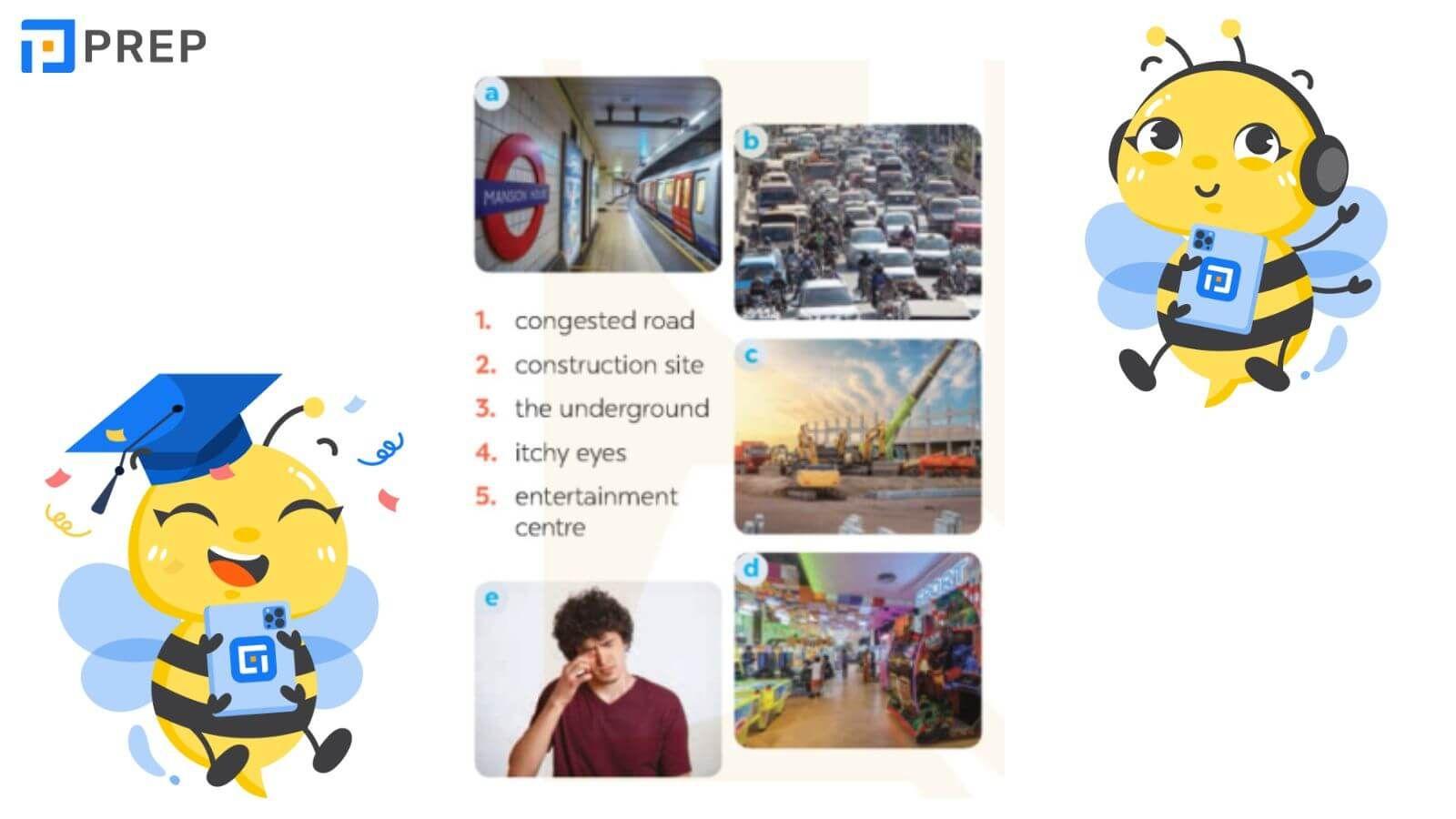
1.4. Choose the correct answer A, B, C, or D
Chọn câu trả lời đúng A, B, C hoặc D.
1. I like getting around by _______ I hate the smell of car exhaust.
-
A. underground
-
B. private car
-
C. taxi
-
D. bus
2. Road dust may badly affect our _______.
-
A. stomach
-
B. back
-
C. eyes
-
D. leg
3. There's a _______ in my neighborhood. It's noisy and dusty.
-
A. building
-
B. construction site
-
C. hospital
-
D. lake
4. The road is narrow, so _______ often occurs at rush hour.
-
A. traffic light
-
B. traffic flow
-
C. traffic congestion
-
D. traffic safety
5. Many teens fancy spending their weekends in an entertainment _______.
-
A. industry
-
B. value
-
C. business
-
D. centre
1.5. Quiz. A lifestyle survey: City life or village life?
Hoàn thành bài đố. Sau đó so sánh lựa chọn của bạn với lời giải thích của bạn bè và giáo viên. Cái nào phù hợp với bạn hơn, cuộc sống ở thành phố hay ở làng quê?
1. What kind of house do you want to live in?
-
A. A small and modern apartment.
-
B. A house with a garden.
2. How do you like to get around?
-
A. By public transport.
-
B. By motorbike or bicycle.
3. Where do you frequently enjoy visiting?
-
A. Shops, restaurants, cinemas, and art galleries.
-
B. Local farmers' markets.
4. How do you describe your favourite neighborhood?
-
A. Crowded and busy.
-
B. Quiet and green.
5. How do you like to spend time outdoors?
-
A. Going for a walk or running in the park.
-
B. Doing gardening or visiting next-door neighbors.
2. Tiếng Anh 9 Unit 2 A Closer Look 1
2.1. Match the words/phrases with their explanations
Nối các từ/cụm từ với lời giải thích của chúng:
2.2. Choose the correct answer A, B, C, or D to complete each sentence
Chọn đáp án đúng A, B, C hoặc D để hoàn thành mỗi câu:
1. The sky train is _______ with commuters at rush hour.
-
A. packed
-
B. full
-
C. busy
-
D. interesting
2. The town's public amenities make it a _______ place for its residents.
-
A. crowded
-
B. boring
-
C. liveable
-
D. dull
3. It's not always _______ on the metro. Pickpocketing sometimes takes place.
-
A. careful
-
B. dangerous
-
C. noisy
-
D. safe
4. It is often more _______ to live in the downtown than in the suburbs.
-
A. convenient
-
B. peaceful
-
C. quiet
-
D. silent
5. Hong Kong is like a concrete jungle with so many people in it. It's a _______ city.
-
A. calm
-
B. quiet
-
C. bustling
-
D. high
2.3. Complete the texts, using the words and phrases from the box
Hoàn thành đoạn văn, sử dụng các từ và cụm từ trong hộp:
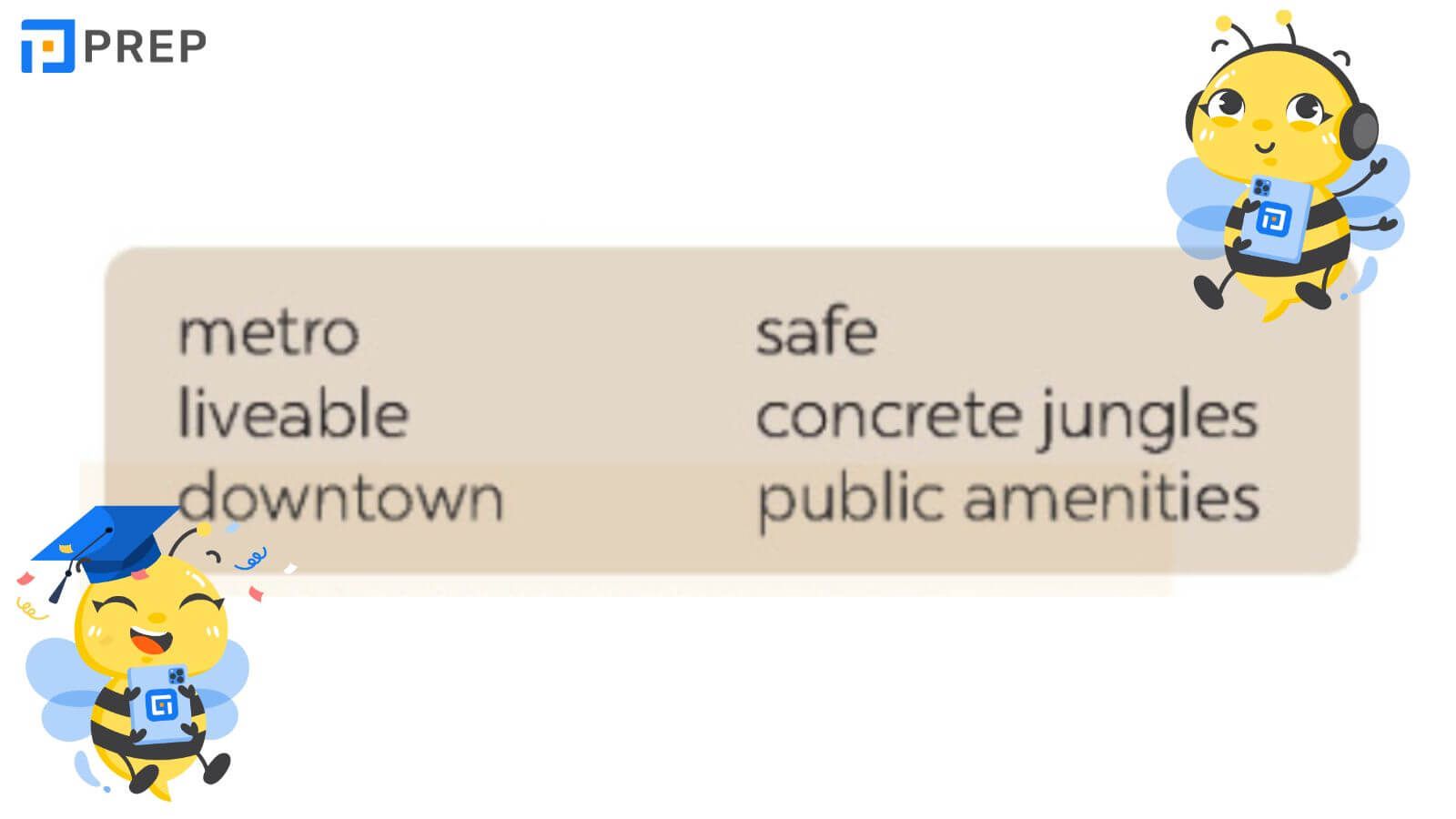
-
John: City life is great! People can travel by public transport, like buses and the _________ (1). There are good schools and hospitals, and other _________ (2) such as parks, cinemas, and sports facilities. They make cities _________ (3) places for people.
-
Jenny: City life is terrible! The _________ (4) area is too crowded. Public transport is always packed with people. Some cities are like _________ (5) with so many buildings. Some cities are not _________ (6) because of high crime rates.
2.4. Put the words in the correct column. Then listen and check
Xếp các từ vào đúng cột. Sau đó nghe và kiểm tra:
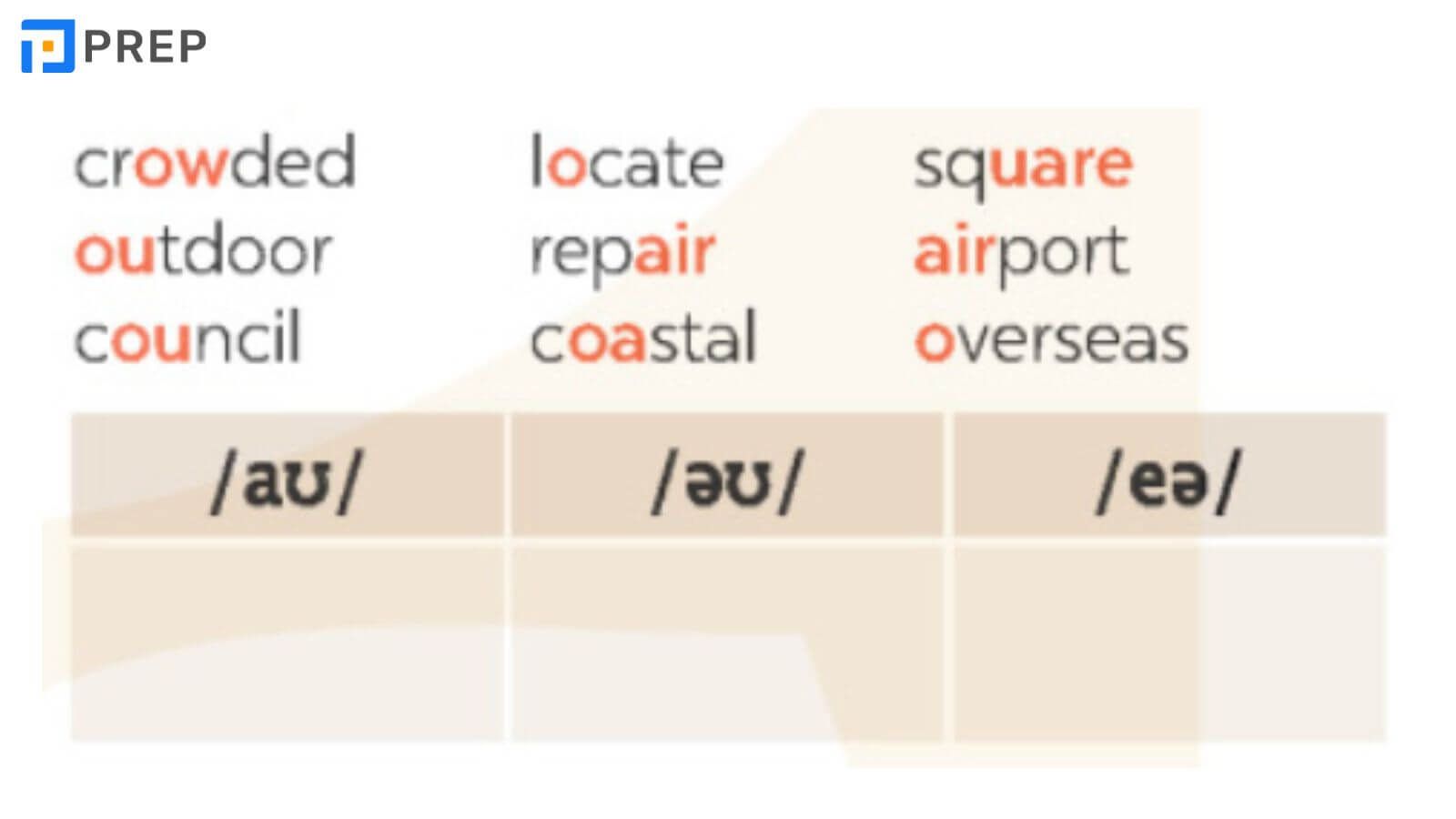
2.5. Read the sentences
Đọc các câu. Khoanh tròn các từ có /aʊ/, gạch chân những từ có /ǝʊ/, và đánh dấu (v) bên cạnh những từ có /eǝ/. Sau đó nghe, kiểm tra và thực hành các câu.
-
They go shopping downtown.
-
The chairman comes from a coastal city.
-
Buses in the old days were not as crowded as they are now.
-
She gets around the city easily thanks to the apps on her phone.
-
I hope we will arrive at the city square in time for the fashion show.
3. Tiếng Anh 9 Unit 2 A Closer Look 2
3.1. Choose the correct option to complete each sentence
Chọn phương án đúng để hoàn thành mỗi câu:
-
Lan isn't home yet. The later / more late it gets, the more worried I get about her.
-
He wants a new house. The larger the house is, the comfortable / more comfortable he feels.
-
She thinks the bigger the city is, higher / the higher the cost of living gets.
-
The famouser / more famous the city is, the higher number of tourists it can attract
-
The larger population the town has, more difficult / the more difficult it is to find a job.
3.2. Find a mistake in the underlined parts in each sentence below and correct it
Tìm lỗi sai ở phần gạch chân trong mỗi câu dưới đây và sửa lại cho đúng:
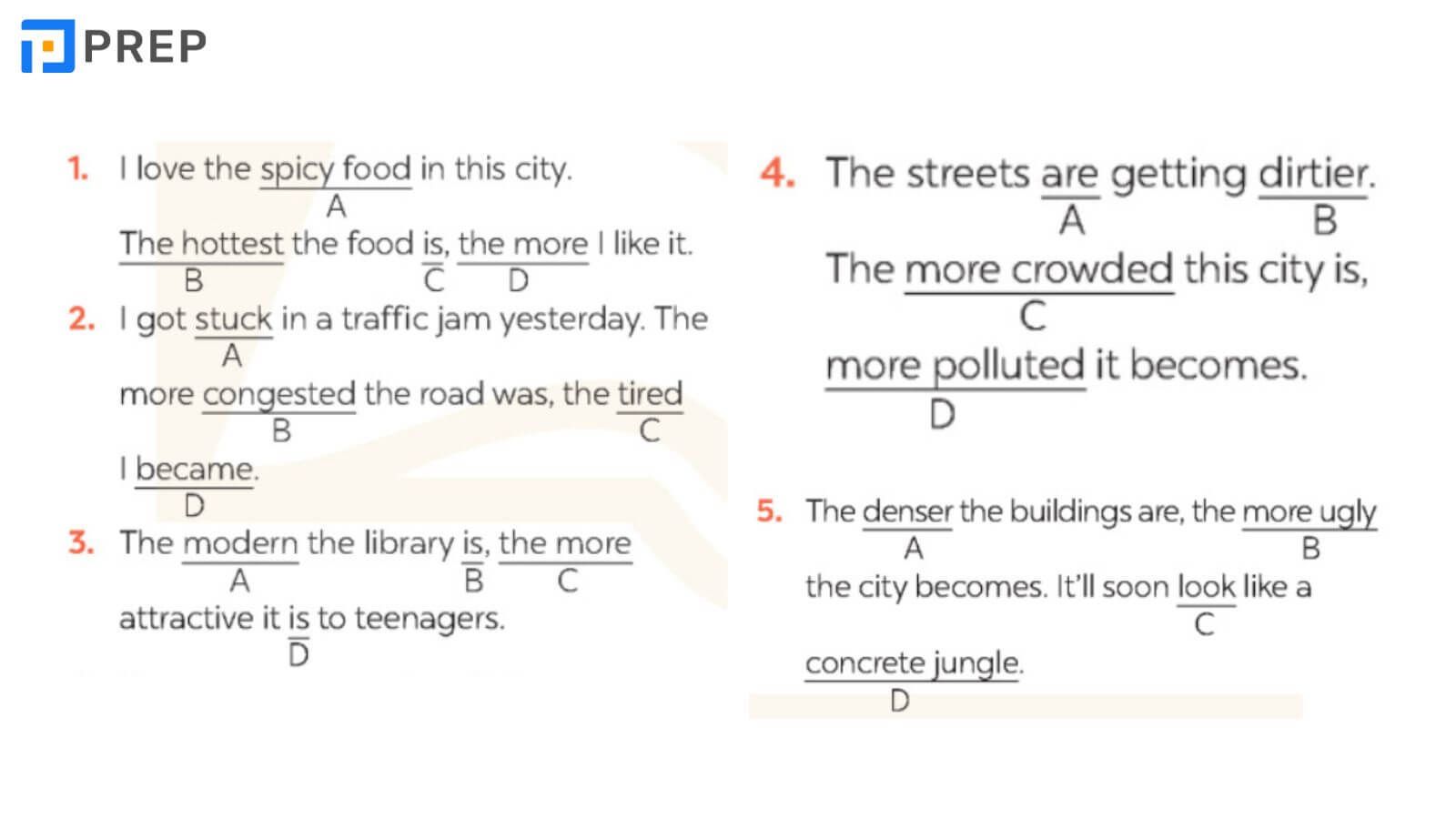
3.3. Match a phrasal verb in column A with a suitable word/ phrase in column B
Nối một cụm động từ ở cột A với một từ/cụm từ thích hợp ở cột B:
3.4. Complete each sentence with a phrasal verb in 3
Hoàn thành mỗi câu với một cụm động từ ở phần 3. Bạn có thể thay đổi dạng của động từ khi cần thiết:
-
I'm ______ a cold. I have a runny nose and a sore throat
-
We all need to ______ using our cars and ride our bikes more to reduce air pollution.
-
When I was in town, I chose to ______ by bus.
-
Where do teenagers in your neighborhood often ______ each other?
-
The authority is ______ a plan to solve traffic congestion in the downtown area.
3.5. Work in pairs
Làm việc theo cặp. Hãy cho nhau biết bạn đồng ý hay không đồng ý với những ý kiến sau:
-
The busier the city is, the more unhappy its people are.
-
The older the city becomes, the less attractive it is to immigrants.
-
Your hometown should cut down on noise pollution.
4. Tiếng Anh 9 Unit 2 Communication
4.1. Listen and read the conversations below
Nghe và đọc đoạn hội thoại dưới đây. Hãy chú ý đến những phần được làm nổi bật.
4.2. Work in pairs
Làm việc theo cặp. Thực hiện các cuộc hội thoại tương tự với các tình huống sau:
1. Your friend doesn't know how to use the library smart card. You offer to show him/ her. (Bạn của bạn không biết cách sử dụng thẻ thông minh của thư viện. Bạn đề nghị với anh ấy/ cô ấy.)
2. A teacher wants to talk to Ms Hoa, but she is not there. You offer to write a note for Ms Hoa. (Một thầy giáo muốn nói chuyện với cô Hoa nhưng cô không có ở đó. Bạn đề nghị viết một lời nhắn cho cô Hoa.)
4.3. Work in pairs
Làm việc theo cặp. Đọc mô tả của ba thiếu niên về phương tiện giao thông yêu thích của họ. Sau đó hoàn thành bảng dưới đây:
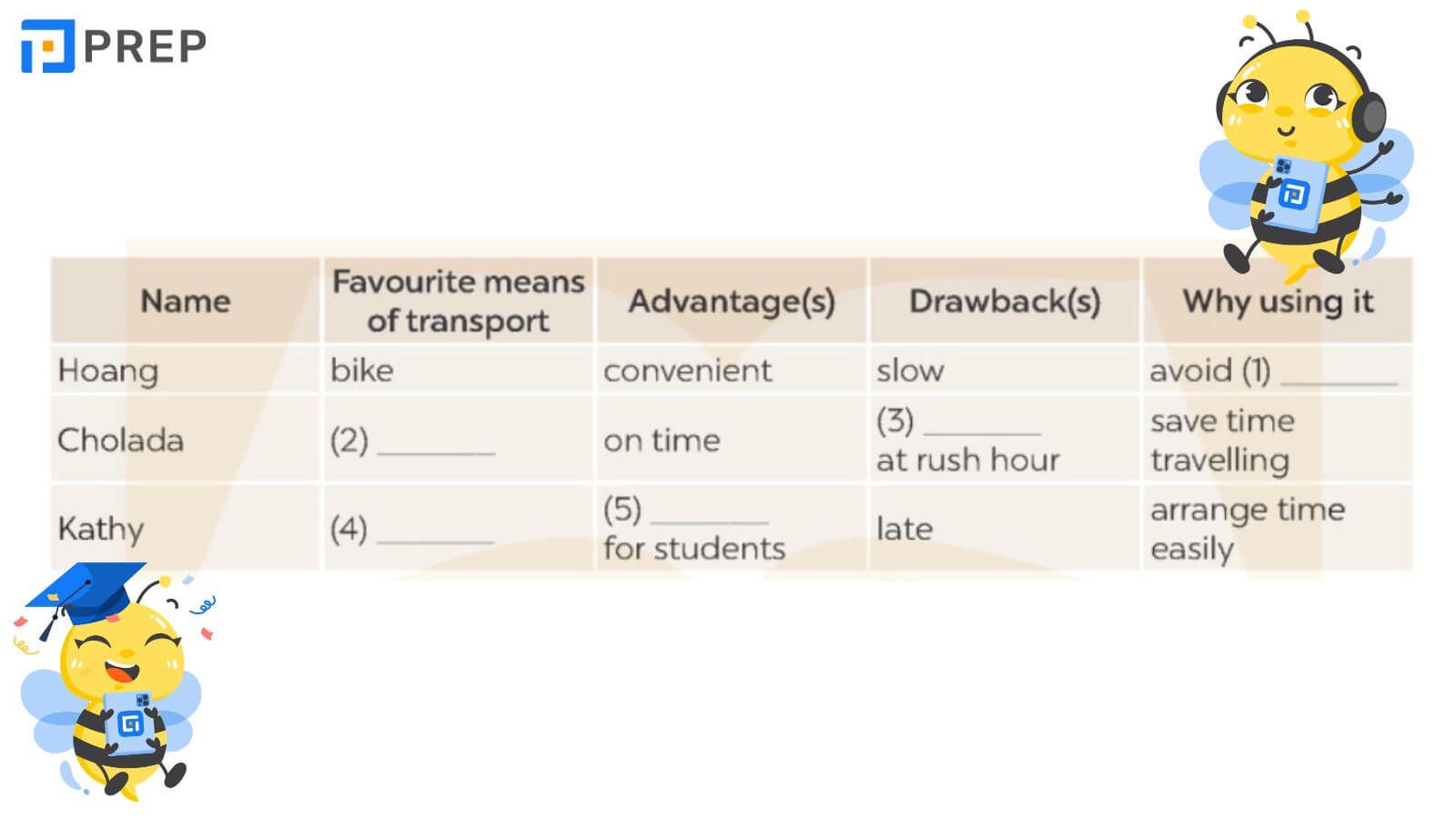
-
Hoang: I live in the suburbs of Ha Noi. I use my bike to get around. It's convenient because I can ride it to places where the bus line doesn't reach. Going by bike might be a bit slow, but I can avoid traffic jams.
-
Cholada: My favourite means of transport in Bangkok is the sky train. It's crowded at rush hour, but it's always on time. It doesn't get stuck in traffic jams, so I can save time travelling.
-
Kathy: I love the tram in Melbourne. It offers a discount for students. Sometimes the tram is late, but it always updates its arrival on a smartphone app, so I know in advance and arrange my time easily.
4.4. Make notes about a means of transport you are using
Ghi chú về phương tiện giao thông bạn đang sử dụng:
-
Name of the means of transport
-
Its advantage(s) and drawback(s)
-
Why you choose to use it
4.5. Work in groups
Làm việc theo nhóm. Nói chuyện với bạn bè của bạn về phương tiện giao thông mà bạn sử dụng. Sử dụng ghi chú của bạn trong phần 4.
5. Tiếng Anh 9 Unit 2 Skills 1
5.1. Work in pairs
Làm việc theo cặp. Nối các từ/cụm từ với hình ảnh của chúng.
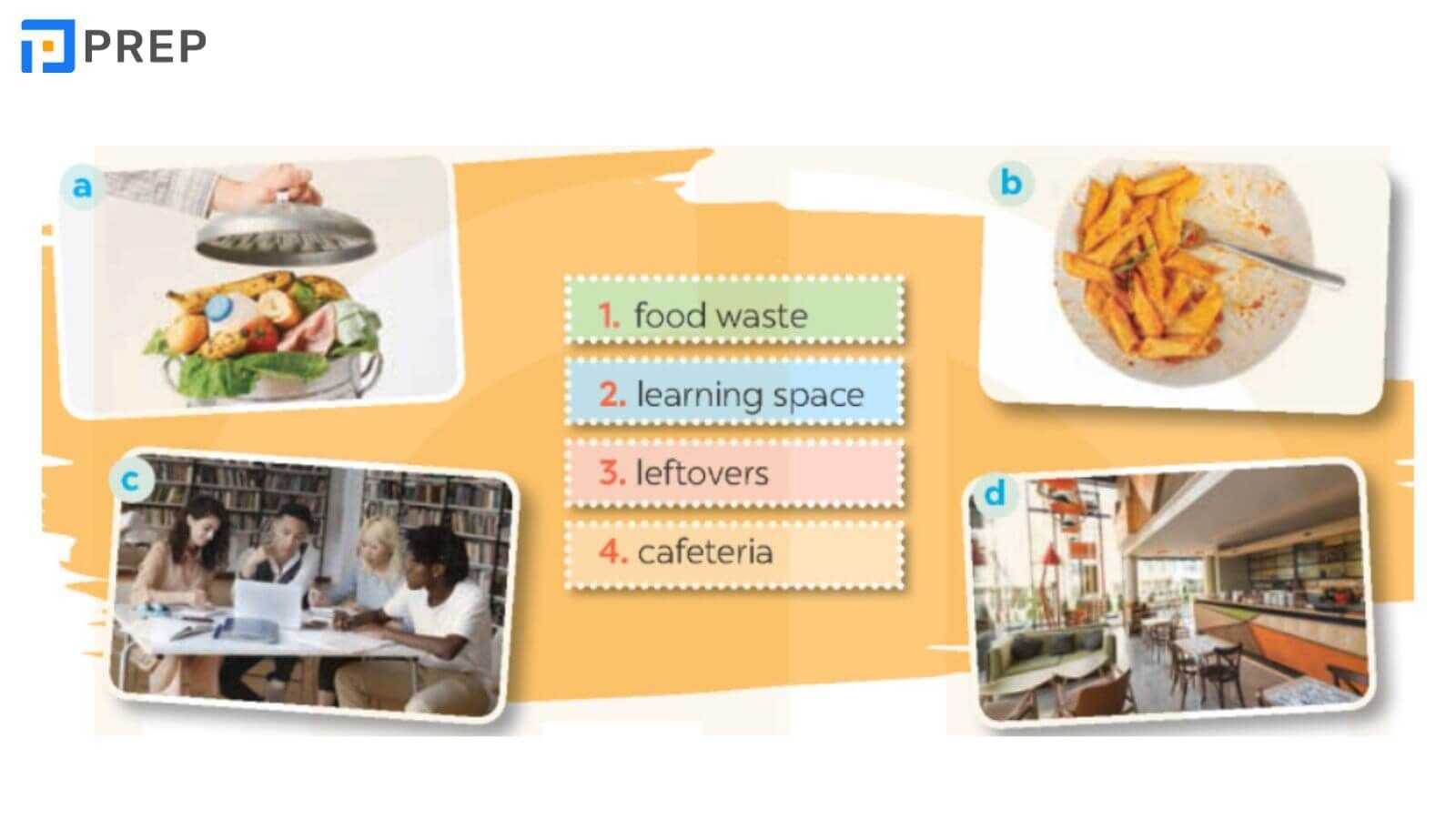
5.2. Read part of an announcement about the Teenovator competition
Đọc một phần thông báo về cuộc thi Teenovator. Hãy nối các chủ đề trong cuộc thi với người chiến thắng. Có một chủ đề thừa:
List of topics:
-
A. The street-safe city
-
B. The teen-friendly city
-
C. The food-smart city
-
D. The waste-free city
Teenovator competition
Teenovator is an annual competition by the City Teen Council. We ask teens to find problems of the city and suggest solutions. Here are this year's winners
1. _________: Central School
They see that the more developed a city is, the more food people throw away. They suggest carrying out a project which turns food waste into energy. Students would sort their leftovers at school canteens. A nearby farm would come to take the food waste and process it into biogas.
2. _________: Bookworm Team
This team feels that many public amenities, particularly the city library, are not teen-friendly. They suggest a list of changes so that the library can attract more teens. Some of them include designing lively learning spaces for teens and having teen's favourite desserts in the cafeteria.
3. _________: Helena Wilson
Helena realises that there are too many vehicles around school gates. This is unsafe for children who walk to school. She suggests that the city authorities not allow cars at school gates at drop-off and pick-up times. In addition, they should not let motorbikes park on the pavement near school gates.
5.3. Read the announcement again
Đọc lại thông báo. Chọn câu trả lời đúng:
1. How often does the City Teen Council organise the Teenovator competition?
-
A. Once a year.
-
B. Twice a year.
-
C. Every two years.
-
D. Every three years.
2. Who would partner with Central School in Topic 1?
-
A. The city council.
-
B. The university's canteen.
-
C. A biogas factory.
-
D. A nearby farm.
3. What does the word "them" in Topic 2 refer to?
-
A. Teen users.
-
B. Changes.
-
C. Learning spaces,
-
D. Libraries.
4. Which topic has an individual winner?
-
A. Topic 1
-
B. Topic 2
-
C. Topic 3
-
D. All topics
5. Which of the following is INCORRECT about Helena Wilson?
-
A. She suggests banning bikes at school gates
-
B. She wants the city authorities to take action.
-
C. She thinks cars moving near school gates can cause accidents to children.
-
D. Her concern is road safety around school for children.
5.4. Make a list of city problems and some solutions to them
Lập danh sách các vấn đề của thành phố và một số giải pháp cho chúng:
5.5. Work in pairs
(Làm việc theo cặp. Nói chuyện với bạn bè của bạn về các vấn đề của thành phố và đề xuất giải pháp cho họ. Bạn có thể sử dụng các ý tưởng trong phần 4.
6. Tiếng Anh 9 Unit 2 Skills 2
6.1. Work in pairs and Tick (v)
Làm việc theo cặp. Đánh dấu (v) những điều bạn mong muốn ở quê hương. Thêm nhiều ý tưởng hơn nếu bạn có:
a. Nice parks
b. Modern cinemas
c. Air-conditioned buses
d. Free sports facilities
e. Convenient food stalls
f. Wide roads
6.2. Listen to an interview with three teenagers about life in their cities
Nghe cuộc phỏng vấn ba thiếu niên về cuộc sống ở thành phố của họ. Quyết định xem các câu phát biểu là đúng (T) hay sai (F).
1. There are many facilities for public use in Tom's city.
2. Elena likes spending her free time in shopping malls.
3. Food stalls are not popular in Chi's city.
4. In Chi's city, many teens like street food more than food prepared at home.
6.3. Listen again. Choose the correct answer A, B, or C
Nghe lại. Chọn câu trả lời đúng A, B hoặc C:
1. Where might this interview come from?
-
A. A chat show.
-
B. A documentary.
-
C. The daily news.
2. What is a problem in Tom's city?
-
A. Some buses don't have air-conditioners.
-
B. There are no parks.
-
C. Some roads are too wide.
3. What change does Elena suggest for her city?
-
A. A new shopping mall.
-
B. More free sports facilities.
-
C. More modern sports centres.
4. Chi thinks that _______ should tell teens about the drawbacks of street food.
-
A. parents and the city council
-
B. the city council and schools
-
C. parents and schools
6.4. Writing: Work in pairs
Viết: Làm việc theo cặp. Đặt các cụm từ trong khung vào đúng cột:
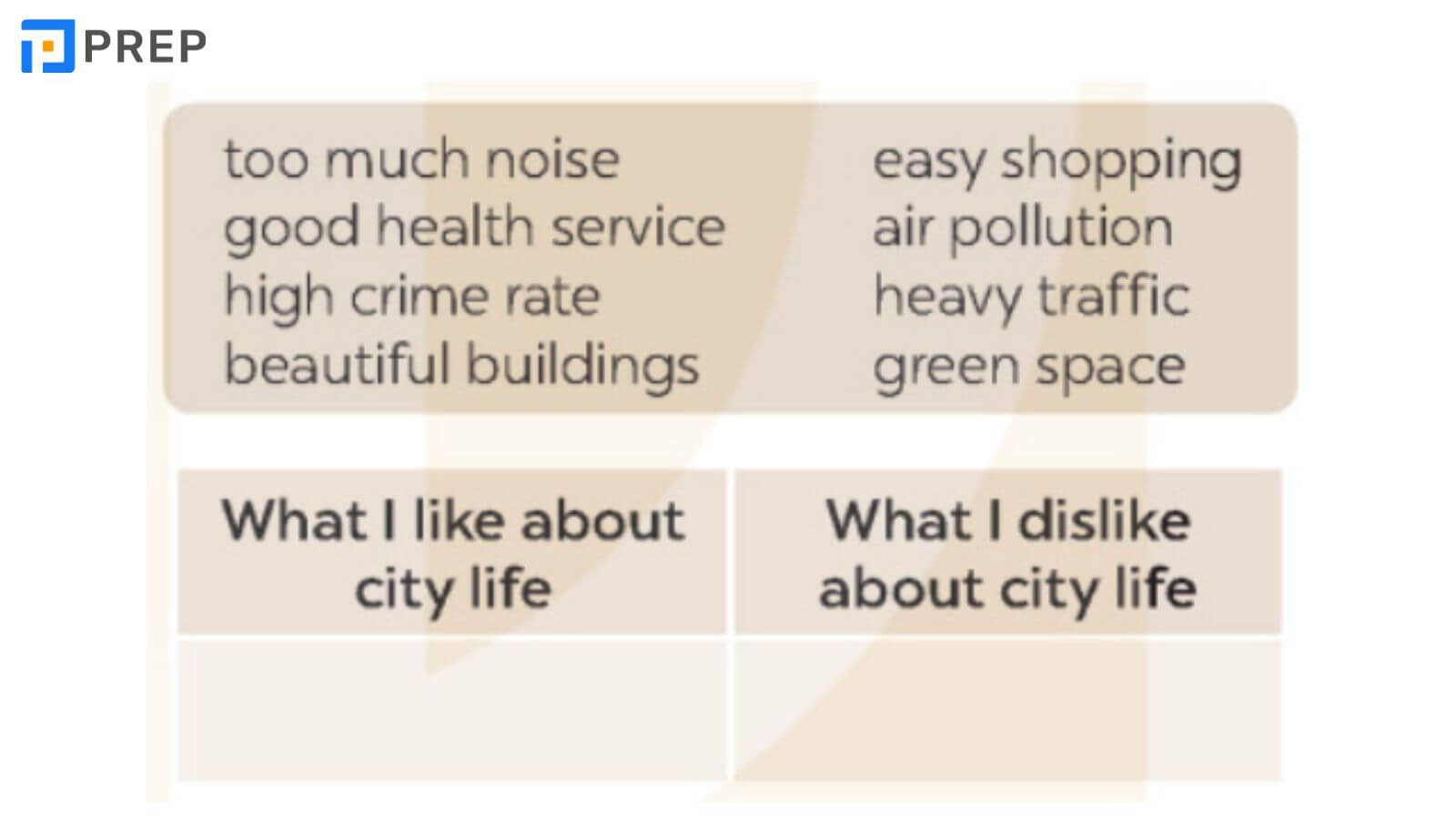
6.5. Write a paragraph (about 100 words)
Viết một đoạn văn (khoảng 100 từ) về những điều bạn thích HOẶC không thích khi sống ở thành phố. Bạn có thể sử dụng các ý ở bài 4 hoặc ý của riêng bạn.
7. Tiếng Anh 9 Unit 2 Looking Back
7.1. Choose the correct answer to complete each sentence below
Chọn đáp án đúng để hoàn thành mỗi câu dưới đây:
1. It takes Jane 30 minutes to travel from her house in the suburbs/downtown to her office in the city centre.
2. Minh prefers the metro/sky train. He finds it more comfortable to go underground than above the ground.
3. The city centre is now packed with high buildings. It looks like an ugly public amenity/concrete jungle.
4. He loves the nightlife of his city. He thinks that it is lively/noisy.
5. Ho Chi Minh City is a slow/bustling city. It is always full of activities.
7.2. Fill in each gap with a word from the box to complete the passage
Chọn đáp án đúng để hoàn thành mỗi câu dưới đây:
Mia lives in a small town. In the past, there were not many people living in the town, so it was rather quiet and _________ (1). Nowadays, it is totally different. The more crowded the town is, the less _________ (2) it becomes. Crime rates are increasing quickly. Moreover, many car drivers don't obey traffic rules, so they indirectly cause traffic _________ (3). Construction sites are everywhere in the town. The dust and dirt from these sites have caused many problems for people's health, for example _________ (4) eyes, runny noses, and acne. All these things make Mia feel that her town is not as _________ (5) as before.
7.3. Complete the sentences with the particles in the box
Hoàn thành câu với các trợ từ trong hộp:
1. People are throwing _______ tons of food each year. This is such a waste!
2. Shopping malls are a popular place for teens to hang _______ one another these days.
3. The city council wants to cut _______ construction noise by 20% in the next five years.
4. The researchers carried _______ a study about people's attitudes towards their cities.
5. Many people come _______ the flu in winter.
7.4. Find a grammar mistake in each sentence and correct it
Tìm lỗi ngữ pháp trong mỗi câu và sửa nó:
1. The dirtier the air gets, more difficult it is for people to breathe.
2. My brother likes to get up the city by bike, but I prefer using public transport
3. Nearer the school is, the more convenient it is for the students.
4. She came up with a cold after walking in the heavy rain.
5. The more slow the Internet is, the angrier the users get.
8. Tiếng Anh 9 Unit 2 Project
8.1. Imagine a future city you would like to live in. Complete the table
Hãy tưởng tượng một thành phố trong tương lai mà bạn muốn sống. Hãy hoàn thành bảng:
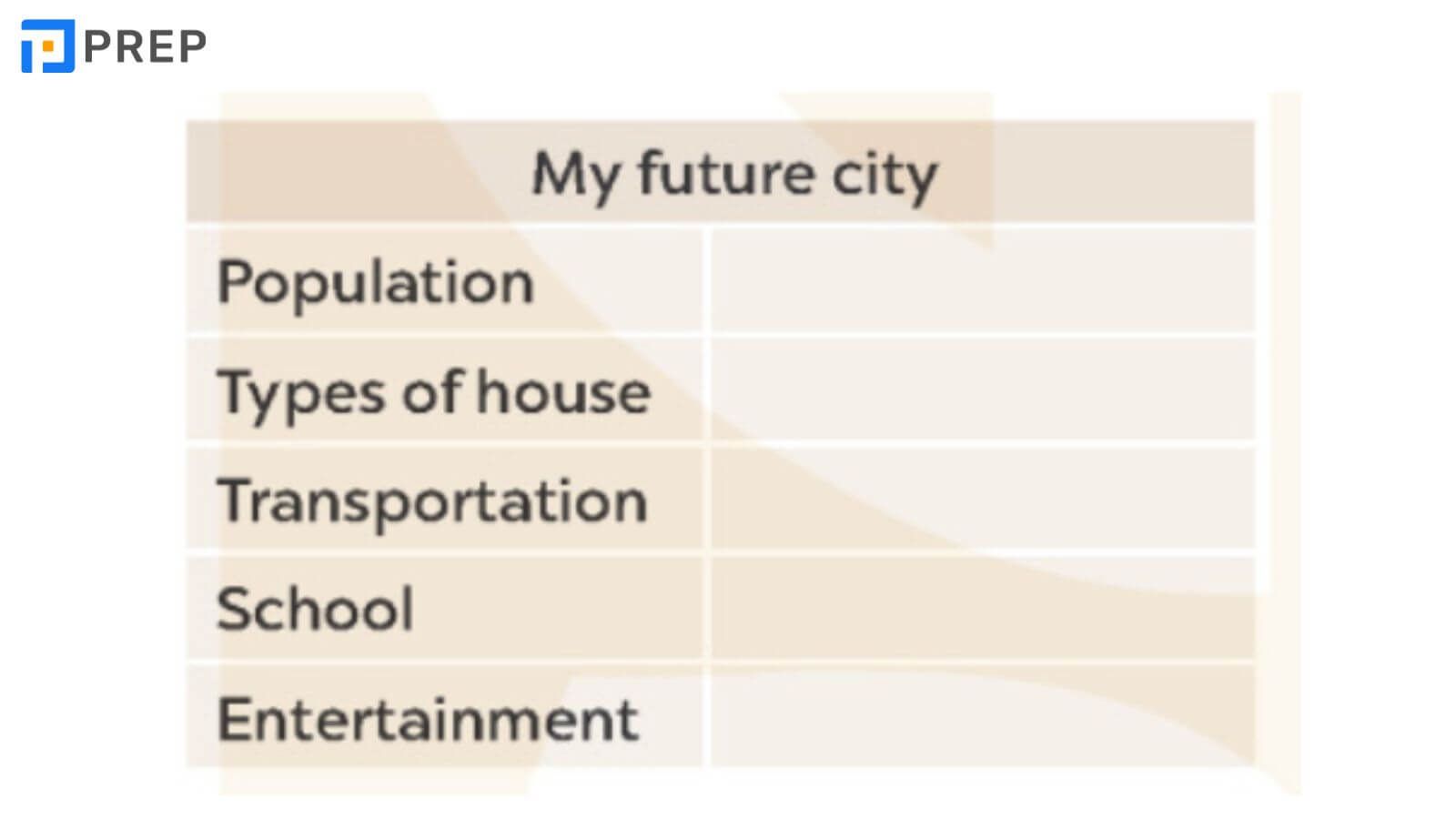
8.2. Prepare a poster presentation on your future city
Chuẩn bị một bài thuyết trình bằng áp phích về thành phố tương lai của bạn. Sử dụng thông tin từ bảng của bạn ở phần 1.
8.3. Present your poster of the future city to your class
Trình bày tấm áp phích về thành phố tương lai trước lớp của bạn.
IV. Đáp án bài tập tiếng Anh 9 Unit 2
Dưới đây PREP đã sưu tầm đáp án và lời giải gợi ý cho các bài tập trong tiếng Anh Unit 2, tham khảo ngay bạn nhé!
ĐÁP ÁN BÀI TẬP TIẾNG ANH 9 UNIT 2
Trên đây PREP đã chia sẻ đầy đủ từ vựng, ngữ pháp, cấu trúc, kiến thức bài học và đáp án đi kèm trong tiếng Anh 9 Unit 2. Thường xuyên truy cập vào PREP để tham khảo thêm nhiều kiến thức tiếng Anh bổ ích bạn nhé!
Link nội dung: https://appstore.edu.vn/tieng-anh-9-unit-2-city-life-a58944.html